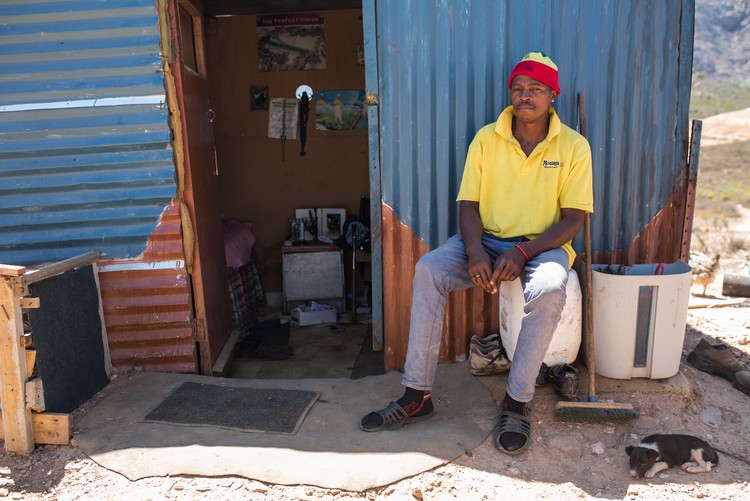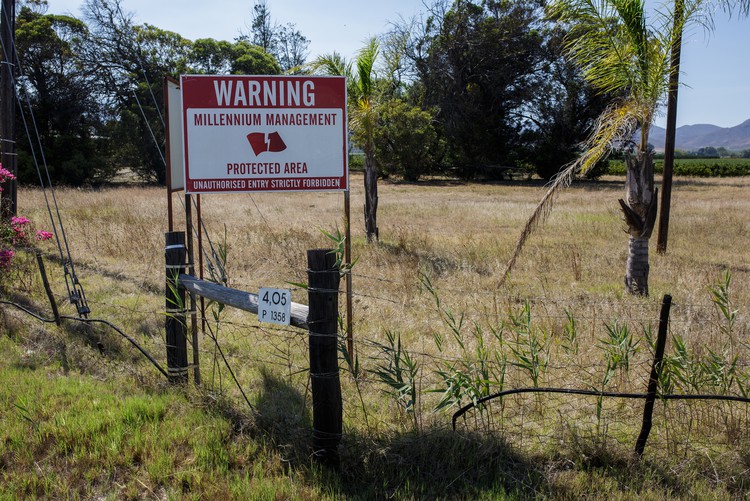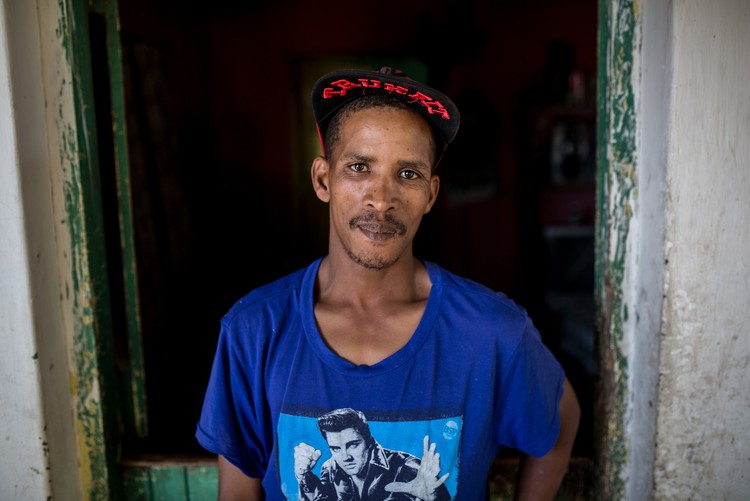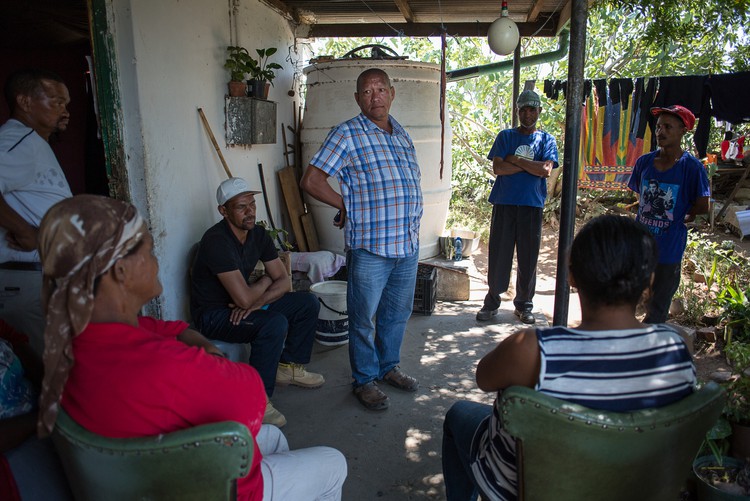Winelands farmers accused of multiple assaults
“Farm workers have no faith in the system … no one is taking the government or the police to task”
Samuel Daarport, 59, is sitting in the offices of the Rural Legal Centre. He has lived and worked on the same fruit farm in Robertson for about 18 years. He says he has faced increasing verbal abuse from his boss in the past few years. Recently, he claims, the farmer slammed the door of a bakkie on his head.
Daarport also alleges that he had witnessed other workers being assaulted by the same farmer, but that this was routinely “swept under the carpet.” Part of the problem, Daarport says, is that “workers are afraid that if they complain and then come back to work, it will just get worse for them. The workers are very scared of the farmer.”
In the Rural Legal Centre’s small office in the township of Nkqubela on the fringes of Robertson, local and migrant workers from the region’s fruit farms and canning factories stream in to seek free legal assistance. According to Shirley Davids, the centre’s chief coordinator, many of the farm workers she meets daily claim that they have been physically assaulted by their employers within the past twelve months.
Mercia Andrews, Director of the Trust for Community Outreach and Education (TCOE), an organisation that deals mainly with rural poverty and land rights and which funds the Rural Legal Centre, agrees that there are “100s of these kinds of cases” of alleged assault in the Cape Winelands. “There are such commonplace stories that show that the lives of poor people in rural areas are not worth a great deal,” she adds.
According to Andrews, farm workers in the Cape Winelands still have little sense of their rights, and she says this leads to incidents of assault going unreported. Even when cases are opened, Andrews says that farm workers will often “backtrack at critical moments, because they lose the confidence to pursue their rights.”
Andrews gives the example of Cedras Prins, who in September 2016 took an out-of-court settlement to withdraw his case of assault against a local Ashton tomato farmer who’d caught him trespassing on his property. Prins was hospitalized as a result of the assault.
Another seasonal farm worker, Colin Cloete, was found dead on the same farm on the day that Prins was assaulted, but the withdrawal of Prins’ case has also hamstrung the affiliated murder case.
Davids says that there have been a number of other claims of assault against the same farmer who assaulted Prins, but that the police have not taken these claims seriously, and in some instances have refused to open cases dockets.
A couple of kilometres outside Ashton in the ramshackle hillside township of Zolani, Nkosinathi Langa, 30, recently told GroundUp that he’d been beaten with a sjambok late last year by the son of another prominent Ashton farmer. Langa claimed that he’d asked to be excused from work one day because he was sick with flu, which is what prompted the beating.
Langa said he went straight to the police to report the incident, but they refused to open a case for him. He sought assistance from Davids at the Rural Legal Centre and went back to Ashton Police Station with her, but Davids says that the police still wouldn’t open a case docket.

Sylvester Joseph, communications officer for the Ashton police, says he knows nothing of this incident, and strongly denies that the station refused to open case dockets or take statements for farm workers. “There is certainly a possibility that farm workers are not reporting assaults, but then we wouldn’t be able to know anything for sure about this,” Joseph adds.
But according to Karel Swart, Deputy General Secretary of CSAAWU, the biggest farm workers’ union in the Western Cape, the local authorities are not doing enough to protect poor farm workers. “Farm workers have no faith in the system. But no one is taking the government or the police to task and we’re sitting with a huge problem. There’s still no culture of protecting human rights on farms,” he says.
Both Alan Winde, Western Cape Government’s Provincial Minister of Economic Opportunities, and Teboho Thejane, a spokesperson for the Department of Labour, told GroundUp that they had carried out inspections on a number of farms in the Western Cape at the end of 2016 following the release of a controversial Danish documentary called Bitter Grapes, which exposed what it called “slavery in the vineyards.” Winde said that “corrective action” had been taken with regards to malpractice on a number of Western Cape farms, but declined to comment further.
Thejane added that the Department of Labour regularly carries out “proactive inspections” on farms, working closely with local police services as well as unions like CSAAWU.
But Andrews feels that the Department of Labour is “struggling in terms of capacity,” adding that her organisation “hasn’t heard anything much from MEC Winde or his department” since last year’s inspections. She reiterates Swart’s assertion that local institutions in small rural towns like Ashton are also failing farm workers. “We are aware of strong family and friendship ties between the local farmers, the police and the judiciary, so this makes it very difficult for farm workers’ cases to achieve any real justice.”
With all of this in mind, CSAAWU’s Karel Swart believes that “farmers know they can basically get away with murder.”

Accusations against security company
But GroundUp’s recent visits to the Winelands revealed that it is not only farmers that are being accused of assault. GroundUp interviewed five farm workers from three different farms who shared similar stories of assault over the course of 2016 by personnel from Millennium Management, a private security company that operates on a large number of farms in the area.
According to Swart, Millennium was hired by a consortium of Robertson farmers in the aftermath of mass strikes and protests in De Doorns in 2012 and 2013, which saw at least three people killed and damage to property amounting to approximately R160 million.
“The farmers were on the verge of collapse, so they brought Millennium in to reign everything back in. They are all white guys from the old order, ex-soldiers and so on – they have nothing to do with the community. They are monitoring, intimidating and assaulting farm workers, or threatening them if they are talking to unions,” Swart says.
According to farm labourer Ricardo Engelbrecht, 28, Millennium personnel came into his home while he was sleeping, pulled him from his bed and threw him against a wall. Another elderly farm worker who wished to remain anonymous for fear of reprisal claimed that a Millennium employee dragged him from his house, tied him to the back of a bakkie, doused him with a bucket of water and then shocked him with a Taser.

Jacobus Adonis, 47, a farm foreman, claimed to have seen a 12-year-old boy being tasered by a Millennium employee for taking a shortcut across private farm land. However, none of the farm workers GroundUp spoke to have opened cases against Millennium with the police. Some claimed that they had tried, but been turned away. Others said they were afraid that opening a case might lead to further intimidation and assaults.
Swart says that a number of charges have been laid against Millennium by farm workers in the past, but that “nothing has ever happened with this.” Engelbrecht said that he did not open a case because he knew of countless other farm workers who had opened cases against Millennium, only for them to be thrown out.
At Ashton Police Station, Sylvester Joseph confirmed that cases had been opened against Millennium in the past, but declined to comment further.
Englebrecht told GroundUp that he believed the police were “always on the side of the farmers,” a claim that Swart agrees with. Swart went to so far as to suggest that the police are allowing Millennium to operate with impunity in the area.
Again, Joseph refutes these claims: “If anyone is dissatisfied with us, the police, they can come forward and lay a formal complaint. I’m not aware of any such complaints having been laid.”
In an official letter from Millennium’s Head Office responding to questions from GroundUp, the company said that it worked closely with local police with a view to “addressing crime, sharing crime intelligence and generally trying to stabilise the area.”
The letter went on to say that Millennium would be conducting an internal investigation into allegations of misconduct, and that the company “refutes being aware of widespread assault and intimidation occurring in our Robertson project area, nor would we condone that behavior.”
Millennium also said that it recognised farm workers as “one of the most vulnerable groups in South African society,” echoing the findings of a widely-cited 2011 report by Human Rights Watch entitled ‘Ripe with Abuse’.
AgriSA, a federation that represents South African farmers, did not respond to GroundUp’s many requests for comment on this story.
“There’s certainly a lot that still requires change in the Winelands,” says Andrews, “it’s time for the farms to step into the 21st Century.”
Support independent journalism
Donate using Payfast

Next: Dismissed UWC Securitas staff in mediation talks
Previous: It’s not National Treasury that is blocking economic transformation
© 2017 GroundUp. 
This article is licensed under a Creative Commons Attribution-NoDerivatives 4.0 International License.
You may republish this article, so long as you credit the authors and GroundUp, and do not change the text. Please include a link back to the original article.

